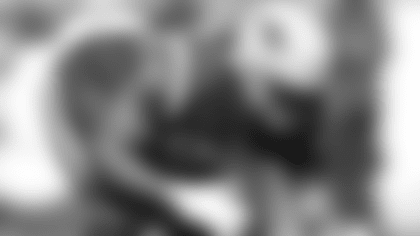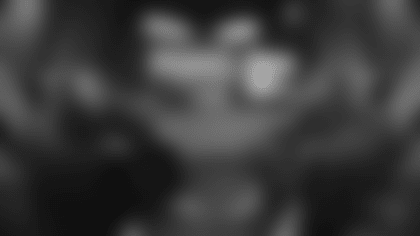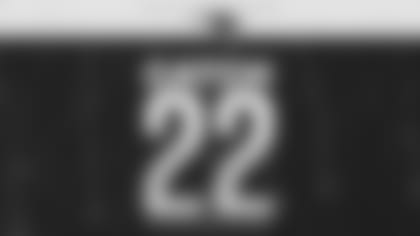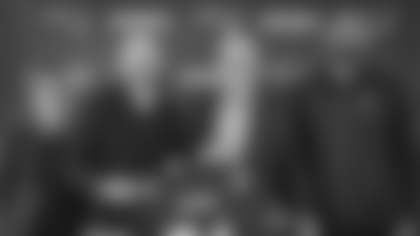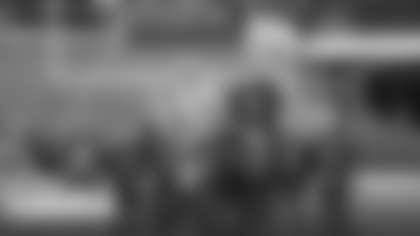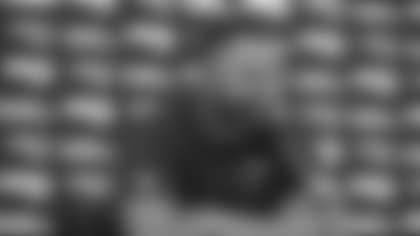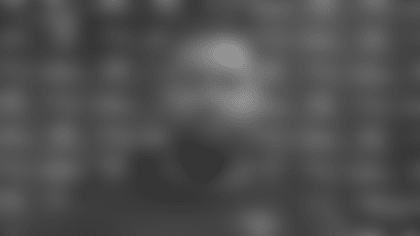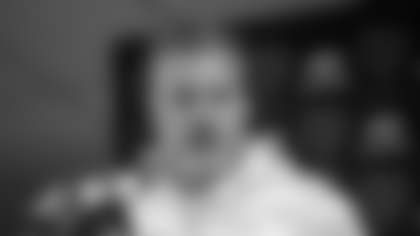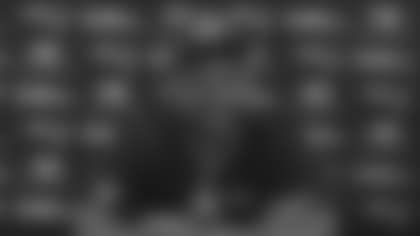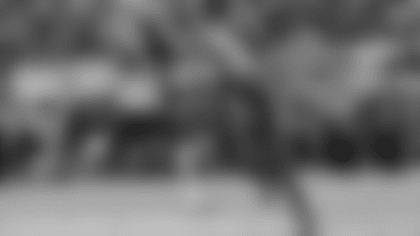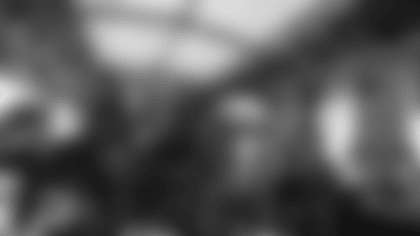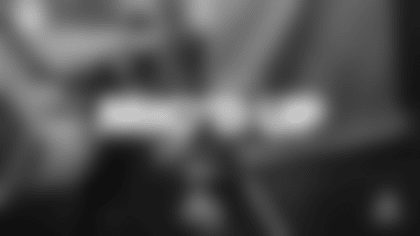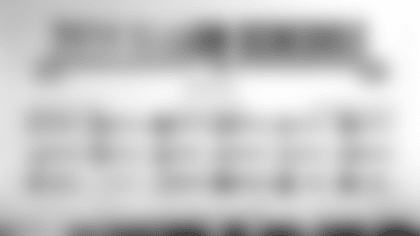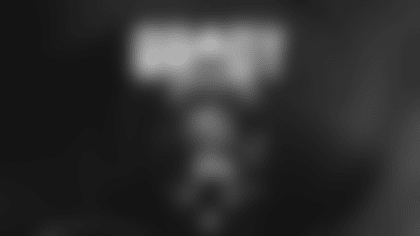NC: I appreciate everybody hanging around. Just a quick recap of the day - so the first pick there in the fourth round, we kind of stayed and picked and picked [Deatrich] Wise, a defensive end from Arkansas. A guy we spent a lot of time with, brought him in for a visit, worked him out, did some different things with him. He has some experience. He played in a good program. Coach [Bret] Bielema does an outstanding job, a lot of respect for his program and the players that they put out. Trey Flowers is a good example. That pick there in the fourth round, and then part of the draft today was the flip of the fifth and sixth- round picks with Kansas City with James O'Shaughnessy, who's a player who we actually did a lot of work on coming out. It was kind of similar to the discussion we had here last week when we had the pre-draft. Just when you go through your draft process, your evaluation process, you never really know when a player may or may not come up. He was a player we had done quite a bit of work on, as well. [We] worked him out, spent some time with him, so he was available. We thought it was an opportunity to add another player to our team, so we made that kind of fifth to sixth. And then the sixth, we just bumped up a few spots, unloaded the seventh and took Conor McDermott, a left tackle out of UCLA, another good program. Coach [Jim] Mora and that staff, they've done a great job out there. A lot of experience, good size, good length, has played against some pretty good people out there. Only four picks, only four players. We're kind of working through the undrafted process right now. The staff really did an awesome job this weekend. I mean Monti [Ossenfort], DuJuan [Daniels], Lip [James Liipfert], Brian Smith, Dave Ziegler - the guys really did an awesome job this weekend. They deserve a lot of credit. You only pick four players, it doesn't seem like there's really much that goes on, but I mean it's a lot of work for four picks. It keeps you guys busy, but you know, look, our thing is we just try to do what's best for the football team. Like we talked about the other day, we try to add players we think are going to have an opportunity to be competitive in our program. We're going to add players post-draft here. We're working through that process here now. I'm sure there are going to be some players that come up here over the next couple of weeks, couple of months, and into the summer and into training camp that aren't here. We're not even talking about whether they're going to end up on the team and whether or not they have an impact on our program. We'll see. That's kind of where we are for today. We're kind of turning the page, really, on this. I mean we'll flip the page here real fast. Tomorrow, phase two of the offseason program where we'll get the opportunity to start working with our players a little bit more intimately where there's a little bit more one-on-one instruction with the coaches, so we're kind of in the next phase of that. We're honestly working on starting - our college scouts have been working on the 2018 draft for the past month. I mean we're moving forward. That's what we're doing. Draft is over, turn the page, move into the offseason program, phase two, get ready for OTA's and then we'll go through our spring scouting process. We're already working on the 2018 draft so that's kind of where we are, and we'll just kind of keep moving ahead. We'll take some questions here and just kind of go from there.
Q: Was the decision to forego making a seventh-round draft choice a reflection of how you felt about the number of draft-worthy players left at that point, and did you think you'd be better suited adding depth in free agency?
NC: Sure. Every year is different. How is one year going to go relative to the next? Nobody really has any idea, so what happened in previous years, I mean really it's just a product - really what you try to do is you try to take the information that you have on the players that you're looking at and just try to make an estimation. We can draft the player, or there's a realistic chance we could maybe sign him after the draft, so you kind of weigh the risk-reward of drafting the player, or if it's the same player that you might be able to get after the draft who's going to have a similar potential role, or you're kind of vision for him on the team, then you go ahead and don't use the pick. I mean every year is different. We stack the players. There are certain players that are up on the board that we're looking at. Like I said, we talked about this last week. There are not a lot of players up on the board that we would actually draft. I mean we have a small number of players that we would actually pick. I mean there are 255 that were selected. I mean 50 to 75 - 75 is probably high - like where we ended up in the end of guys that we would actually draft. Every year is different. It's risk-reward and you just try to make the best decision. I mean we drafted four players. We're probably going to end up signing, I don't know, 15-20 guys here over the next few days. Could you have drafted some of those players? Sure. You do whatever you think is best and just try to make a good decision. Look, we're going to lose out on some players and we're going to get some players that we think we like or we want to work with, and then that's what we try to do.
Q: You guys traded several of your draft picks in the offseason for proven players such as Brandin Cooks, Kony Ealy and Mike Gillislee. Is that a reflection of this year's draft class and is it also possibly tied to Tom Brady nearing 40 years of age and wanting to maximize the time he has left?
NC: To the latter part, I'd say that has zero to do with it. I would say really the team-building process is very fluid. How it's going to go, I mean there is no template. There is no book. Look, there are a lot of really good players that were in this draft that were drafted that are going to help their respective team. We understand that and we felt the same way. There were enough players up there that we felt good about. So we take the resources that we have and we try to make the best decision for our team. It's about trying to put the best team together. However we get to that end point, look, next year may be different than it was this year. I mean this year was different than last year. However we put the team together, I would say it's constantly evolving. It's very fluid and there is no template you pull out and say 'This is what we're going to do this year.' That's kind of how we approach it.
Q: There were reports that Cleveland was trying to acquire Jimmy Garoppolo from you. What ultimately went into the decision not to trade him for a haul of draft picks when it seemed some quarterback-needy teams were making moves to acquire quarterbacks in the draft?
NC: Yeah, whatever other teams do we can't control that. That's their decision. Ultimately, it comes down to what do we think is best for the New England Patriots and that's what we go with.
Q: Are guys like Conor McDermott who has played under a coach with NFL experience like Jim Mora becoming better targets due to the widening gap between the way the college game and the pro game are played these days?
NC: Sure. Look, there are a lot of good coaches in college football. We're not going to be able to pick from every program. I mean look, there are a lot of programs that we have a great amount of respect for. Coach [Bill Belichick] mentioned coach [Bo] Pelini yesterday, just his background. It's a pretty unique background; college, head coach, pro coach. You try to get the information. You talk to the people that you trust. We have a lot of dialogue. We have a lot of great relationships with a lot of college coaching staffs out there. What they're being coached and what they're being asked to do, honestly, isn't what we're going to ask them to do. Maybe you're kind of looking at the program, maybe there are some certain fundamentals, and techniques, and how they work and how they run practice that you might say there may be some carryover, but I would say in the end once they're out of college, then whatever they did at Arkansas, whatever they did at UCLA, honestly, doesn't matter because they're going to be here. They're going to be in the Patriot program and the most important thing for them is to get in our program right away, kind of understand what we expect. It's not that what they did in college was wrong or we disagree with it, it's just how we're going to coach them, how we're going to prepare them and how they're going to be a part of our program. The biggest thing that these players have to do when they get here is get in our program and the sooner that they do that, on a multitude of levels, the better chance at least they're going to have to be competitive with the players that are in our locker room. It's a competitive situation and that's what we want to try and create.
Q: Is part of you still surprised that you walked away from this draft having only selected four players?
NC: No. Whoever we end up with, we end up with. I mean the draft, whoever we pick, there are four players there. We acquired players as a part of trades so they're a part of it. The undrafted players are a part of it. I mean let's call it, I don't know, 25 to 30 new players that we've sort of added to the team. However they get here, they get here. We can't necessarily control that. We just try to take our resources, and try to make the best decision for our team and get the players on our team however we can get them here. That's what we try to do.
Q: You guys twice traded up to take offensive tackles. Is that at all a reflection of Nate Solder's availability for this season or is that more of a long term team-building move when factoring in contracts and things of that nature?
NC: I think in those situations it's really a factor of with your sixth and seventh round pick, if you move up, you moved up three spots and gave up a seventh round pick, so I think it's just a matter of in that situation we have a sixth and a seventh round pick. We're looking up at the board and saying how many of those players would we actually pick? Well, if we're not going to pick them or we think we can get them after the draft, well let's just make sure we get a player that we actually like. I would say it's more a product of just getting the player, trying to secure his services and getting him here than anything else. We're just trying to get the players here and then once they're here, then everything else sort of takes care of itself. There is competition. They're going to have to compete with whoever is here and however the competition plays out, we don't control that. That's not up to me. The player's performance will ultimately dictate how that all shakes itself out. We just try to get the players here. However we do it, I mean giving up a seventh round pick to [move] three or four spots is just to make sure we get the guy. That's all we're trying to do.
Q: You gave up a fourth round pick to move up in the third. Was that a bigger trade?
NC: Yeah, it's really the same philosophy. Where we were picking, we were at 124 and 141 I want to say. So, how many of those guys have a grade that we would say we're going to pick them here and we're going to feel comfortable with them? Or, we have a player that we like. OK, let's just make sure that we get the player here. If we have to give up a little bit in order to get him, it's really just a matter of draft positioning and draft strategy. So I think the focus is on the player. Let's figure out a way to get him here, let's get him here and if we can trade up and get him, great. And then part of it is, too, based on what other teams are doing behind you, so that's where kind of your pro scouting, your needs analysis comes into play. Each team is up there that's behind us, so we're looking at that going, OK, what are their needs? Maybe they're looking at the same player. Alright, well, why risk it? Let's sit there and wait and let's hope it happens. Or, you know what, it looks like there might be an opportunity for us to move in if a team is willing to trade. I mean, we traded with Tennessee and Detroit. We've got a great relationship with them and they were willing to do it. The trades really happen like that. I mean, there's a lot of talk, 'Well, they talk before the draft about trading up, trading down.' It's really you're looking up there going alright, who are the players you like, where are we picking, do we think the guy is going to make it there? Well, we're not sure. Let's see if somebody's interested in trading. At that point, it's all player-driven and player-specific, so we just try to make a good decision and get the player, try to secure his services and get him here.
Q: With Deatrich Wise, how much of a factor was his length in terms of your interest in him?
NC: Yeah, I mean, the player's body composition, his measurables, they're a part of it to a degree. Ultimately, it's going to come down to player performance and then how do they utilize, if they have a strength, how do they utilize that strength or can we get them to a point where they can actually utilize whatever it may be - whether it's his speed, whether it's his quickness, whether it's his strength, whether it's his explosiveness, his power, regardless of the position. I think it's a part of the composition. You're evaluating that, but how does he use whatever assets and strengths that he has and can we get him to a point where it actually can be productive on the field? Everybody's got different shapes. Everybody's got different body types. I wouldn't say that's really a big part of the evaluation. There's not a lot of guys with that type of length, but what does that transfer over onto the field? Ultimately, that's the most important thing.
Q: Does being a multisport high school athlete weigh into the draft process at all?
NC: Hopefully, they're better at football than they are at those sports. I mean, look, a multisport athlete in high school, the guy can do different things. There's certain body control coordination. I wouldn't say it's like because a guy played basketball, oh boy he's going to be a good left tackle. I don't think you're saying that, but eventually they leave high school and they've got to focus on one thing. I wouldn't say it's really a big part of it, but the more things they can do - because sometimes, some track athletes have track speed and track strengths, but that doesn't always translate to the football field. Ultimately, it's kind of taking their body, their athleticism, whatever tools they have and then being able to apply them in a football setting because ultimately they've got to go out there and play football. They're not going to be at TD Garden playing hoops with the Celtics.
Q: Antonio Garcia described himself as a nasty player. Is the nasty part of the game as big now as it used to be?
NC: Look, when you're evaluating a player, you're kind of evaluating the athletic component and there's a playing style component. The NFL is a tough game. It's a very violent game. It's a physical game. So if you're not tough, if you're not physical, then you're probably not going to last very long. You like to see guys that have a good playing style, that have an edge. I mean, it's a physical game, so it's running, it's blocking, it's tackling. This isn't patty cake, so you've got to go out there. It says something about their physical toughness and then they have the mental toughness, so you're putting everything together. Ultimately, it's when they get on the field, it's being able to perform at a good level and being able to perform at a winning level to help our team. I mean, that's the most important thing in the end.
Q: How many of the guys that you drafted had you identified two or three years ago?
NC: Good question. I would say, typically, most of these guys were seniors. So probably junior year, I mean, you're doing work. If you have an idea that maybe a player could be a potential early declare - I mean, look, when you're watching a team - so, as an example, when you're watching Arkansas, if you're watching them a year or two ago, we were watching Trey Flowers. OK, who is on the field? Alright, what year is this guy? This guy's a sophomore. This guy's a junior. At some point, you're going to have to do those players anyways, so your focus isn't on maybe that player at the time but maybe a guy jumps out of the film a little bit and you're making the notes as you go. So you're prepared. Let's say the guy is a sophomore. You're watching Trey Flowers as a senior. Look, Flowers is in the draft. We know this guy. We're going to have to go through the process and be ready for him, but this guy over here that's a sophomore, like is he going to come out as a junior? I mean, look, he may or may not, but you'll evaluate him. Maybe your focus isn't as much on that particular player. You're focused on maybe the seniors. We try to stay ahead on that as much as you can. Look, when the guy's a freshman when he walks on campus, do you notice him? I mean, maybe, if the guy's out there with the rest of the team and he's the star as a true freshman. You're probably going to keep an eye on that guy, especially in a conference like the SEC. You know, it could apply to the Big 10. Look, the players are there. We don't just skip the player and say, 'He's an underclassman or he's a sophomore. Let's not worry about him.' Well, at some point, we're going to have to do him. We try to stay ahead on the process as much as we can. We're not evaluating the player, but you take notice of that and you're prepared for that so that in the event that guy makes a decision, you're not going, 'Oh my gosh, let me go back. I've got to start my process again.' I mean, look, were we watching Wise when we were watching Trey Flowers? I'm not saying that, but if you notice a few plays here and there, you make a note. We know what years these guys are, so when they're a freshman, you start to keep a file on the guy and they go in the database -- I'd say probably in a two to three year window. There were some redshirt sophomores in this draft this year who have only been on campus for three years. Maybe they've only played one year of actual football. They redshirt and then they don't really play, they're a backup and then they start their redshirt sophomore year. So, are you ready for that guy? Well, you might have to be, and if the guy's starting, he must be a pretty good player. There's really no specific timetable - OK, we're going to start watching them here. Look, we're watching the players. Whenever they declare, they declare and then we'll dig a little bit more and drill down and do a little bit more work and then kind of pick it up from there.
Q: Do you have an agreement with BYU linebacker Harvey Langi?
NC: We're working through the process. I mean, we're still in the draft room trying to finish that up. When those are final, we'll put an announcement out on those.
Q: Do you think all 20 open roster spots will go to undrafted rookies?
NC: We'll see. I mean, I think there will be some rookies. I'm sure we'll have some things here in the rookie minicamp where we bring guys in that we don't have a contract commitment to. I'm sure there's some other players that will be here that aren't under contract that we'll evaluate, and then we'll go through like we do always in the spring. I'm sure we'll bring some player in to work out. I mean, we're always trying to put together the most competitive roster we can. Wherever the players come from, they come from.
Q: How much do players' performances in the Senior Bowl and East West Shrine Game go into your evaluations?
NC: They're definitely a part of it. You have this big body of work. So, if a player plays in a big conference, he's got two or three years of production against pretty good players. The Senior Bowl is usually the top players in the country, so you get a chance to see kind of good-on-good. East West - kind of the same idea. Where it probably helps a little bit is players on a lower level that maybe haven't competed against the same level of competition. Obviously, they're making a big jump. You had the tackle from Bucknell this year who was at the Senior Bowl. I mean, Garcia was down there. That's going to be a big jump in competition because this is what they're going to be playing against. With all due respect to whatever conference Youngstown State is in, there's not a lot of NFL players in that conference. I mean, that's just the way that it is. You're going to have to see him against NFL competition, which the Senior Bowl is usually a pretty good indication of that because you're talking about the top seniors in the country. It's a part of the process. You're not making a decision based off of that, but maybe a player who doesn't have as much experience against that level, you're going to see how he fares, and then you just kind of continue to move forward.
Q: How much work did you put into scouting James O'Shaughnessy coming out of Illinois State?
NC: Yeah, we went down there, we worked him out before the draft, so we had some contact with him. I mean, he was a player that we liked that year and the Chiefs ended up picking him. He's had some experience offensively. He's had a decent role in the kicking game for them down there in Kansas City, and he's a young player. We'll put him in a mix. I mean, obviously, he knows nothing about our system. He hasn't been in our system, so we're kind of starting from scratch with him. We'll put him in the mix with everybody else and see how he does.





